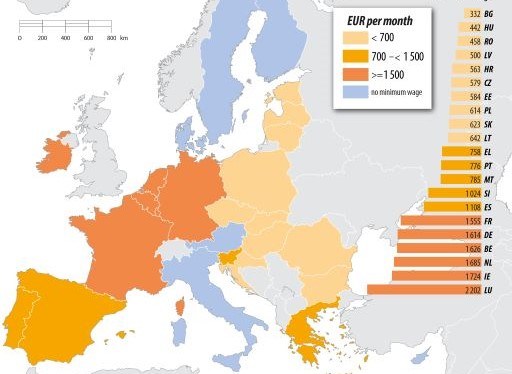The presidency of the Council and European Parliament negotiators reached on Tuesday morning a provisional political agreement on a draft directive on adequate minimum wages in the EU based on a proposal from the European Commission in 2020.
As previously reported, the European Parliament’s chief negotiator and co-rapporteur Dennis Radtke described the agreement as a historical event. “We are writing social policy history in Europe”.
When the Commission launched its initiative, it assured that it would aim to ensure that both “well-functioning collective bargaining in wage-setting is in place” and that “national frameworks allow for statutory minimum wages to be set and regularly updated according to clear and stable criteria”.
The political agreement was immediately welcomed by the Commission. “The EU has delivered on its promise,” Commission President Ursula von der Leyen said. “The new rules on minimum wages will protect the dignity of work and make sure that work pays. All of this will be done in full respect of national traditions and social partners’ autonomy.”
The Executive Vice-President for an Economy that Works for People, Valdis Dombrovskis, added: “This framework on minimum wages is a fundamental step towards protecting workers across our Union, while respecting national competences and social partners' autonomy.”
Agreement not published yet
In the meantime, the agreement has not been finalised. Even the member states have not yet received a copy of it, as a spokesperson of the Swedish labour market ministry told The Brussels Times. Sweden, a member state known for its model based on collective bargaining, is concerned about the new legislation.
The Swedish minister for labour market and gender equality, Eva Nordmark, announced on Tuesday that the Swedish government will say no to a directive on minimum wages. “We don’t want legislation on minimum wages on EU-level. Wage formation will continue to be the responsibility of labour unions and employers (social partners).”
Swedish MEP Heléne Fritzon, S&D group vice-president, told The Brussels Times that she will vote against the agreement in the plenary. ”We social-democrats support the objective to raise wages for ordinary people across Europe. But statutory minimum wages on EU level is the wrong way forward.”
When the Commission presented its proposal for a directive, she welcomed its general direction. “Sweden wants to safeguard its model. There was a broad majority in the Council to respect different wage setting models. Its proposal is balanced and we hope that it will be respected.”
For the time being, however, it is impossible to say if and how the provisional political agreement deviates from the Commission proposal.
A spokesperson of the Council clarified that lawyer linguists are currently consolidating the text which was agreed during the last trilogue. “The text will be made available to member states in the next couple of days and will be published after endorsement by ambassadors of EU member states.
Promotion of collective bargaining
The chief spokesperson of the Commission explained today that the Commission had welcomed the fact that a political agreement had been reached but declined to comment on its details. The Commission is aware that the issue is a sensitive in Sweden and Denmark with its systems of collective bargaining.
Minimum wage protection exists in all EU member states, either through statutory minimum wages and collective agreements, or exclusively through collective agreements. Yet, some workers are affected by low adequacy and/or gaps in the coverage of minimum wage protection.
According to the Commission, the new directive aims to address this by establishing an EU framework to improve adequate minimum wage protection. “This will be done in full respect of national traditions and competences as well as the autonomy of social partners. It does not require member states to introduce statutory minimum wages, nor does it set a common minimum wage level across the EU.”
In fact, the new directive will support collective bargaining in all member states, according to both the Council and the Commission. The directive is inspired by the models in countries like Sweden and Denmark and will promote collective bargaining in all member states, the Commission explained.
This is because countries with high collective bargaining coverage tend to have a lower share of low-wage workers, lower wage inequality and higher wages. The directive asks member states where the coverage is less than 80% to establish an action plan to promote collective bargaining.
M. Apelblat
The Brussels Times

